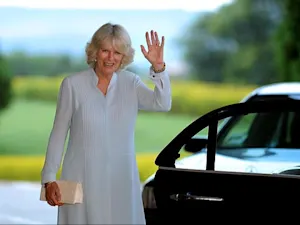
Kamala Harris Reveals 'Sadness' Behind Historic Campaign
Kamala Harris as Vice President of the United States, 2021. Photo courtesy of Lawrence Jackson. Public domain.
In a rare and revealing occasion, former vice president Kamala Harris opened the doors of her Los Angeles home to Joy Reid for an exclusive interview on "The Joy Reid Show." The occasion was to promote Harris's new book, "107 Days," a gripping account of her whirlwind presidential campaign after President Joe Biden's unexpected withdrawal from the 2024 race. But what struck Reid most was not just the political revelations or campaign drama. It was a surprising emotional undercurrent — a sadness and alarm in Harris that Reid said she was "not used to seeing."
This was a Kamala Harris unlike the one the public usually knows. The poised, confident trailblazer who has long carried herself with a joyful spirit seemed weighed down by a heavy burden. Reid sensed a guardedness in Harris, a reluctance to fully unpack her feelings about the Biden administration despite candid anecdotes in her book. The former vice president's loyalty to Biden appeared to temper her openness, creating tension between personal frustration and political allegiance. It was a glimpse behind the polished public persona, revealing a woman grappling with the emotional toll of a historic but painful political journey.
A Political Thriller With a Personal Cost
"107 Days" chronicles a dramatic chapter in American politics: a sitting president stepping aside just months before the election, thrusting Harris into a high-stakes race against Donald Trump. Harris described the book as a nonfiction political thriller, capturing the intensity and chaos of those final months. Yet, beneath the adrenaline of the campaign trail, the interview revealed a more vulnerable side.
Joy Reid noted that Harris was "reticent to really go there" when it came to discussing the Biden administration, as reported by Page Six, suggesting a deep sense of loyalty that kept her from airing grievances publicly. This restraint contrasted sharply with the raw emotions Harris shared about the election loss itself. On "The View," Harris had previously described the night of her defeat as "traumatic," as reported by Entertainment Weekly, revealing that she grieved in a way she hadn't since her mother's death. The pain was not just about losing a race but about what the outcome meant for the country's future.
This emotional complexity was palpable in the interview with Reid. Harris's usual joyful demeanor gave way to a somber reflection on the state of the nation. Reid described sensing "a little bit of sadness," and "alarm" in Harris, as reported by Page Six, emotions that seemed to weigh heavily on her as she navigated the aftermath of the campaign and the challenges ahead.
Guarded Loyalty and Public Scrutiny
Harris's loyalty to Biden is a defining feature of her political identity, but it also appears to be a source of internal conflict. In the interview, she made it clear that her book was not about Biden or her vice presidency except as context for the 107 days of the campaign. This framing suggests a careful balancing act — acknowledging her role without overshadowing the narrative she wanted to tell.
Reid's observation that Harris was less forthcoming about the Biden administration hints at the emotional burden of maintaining public unity while privately wrestling with frustrations. The former vice president's guardedness may reflect the pressures of political loyalty amid a turbulent national landscape.
Adding to the complexity is the ongoing public scrutiny Harris faces, including racially charged attacks from President Donald Trump, who infamously claimed she "happened to turn black" for political gain, as reported by Page Six. Harris's defiant response in the interview, affirming her identity as a Black woman born to a Black Jamaican father and an Indian mother, underscores the personal resilience required to withstand such attacks.
The Weight of History and Hope
Harris's campaign was historic, breaking barriers as the first woman of color to run for president on a major party ticket. Yet, the emotional toll of that historic run is evident. The grief she expressed over the election loss was not just personal but deeply tied to her vision for the country. She knew what the outcome meant, and the weight of that knowledge was crushing.
Her husband's quiet prayers on election night, hoping for a better result, and her own reflections reveal a woman carrying the hopes of many while confronting harsh realities. Reid's sense of sadness in Harris captures this poignant moment — a leader caught between the exhilaration of breaking new ground and the heartbreak of falling short.
A New Chapter Begins
Despite the sadness and alarm, Harris's story is far from over. "107 Days" offers a candid look at a campaign that defied expectations and a woman who faced extraordinary challenges with determination. The interview with Reid provides a rare window into the emotional landscape behind the headlines, reminding us that even the most public figures carry private struggles.
References: Joy Reid senses 'a little bit of sadness' in Kamala Harris talk | Kamala Harris tells 'The View' about grieving 'traumatic' election loss to Donald Trump























